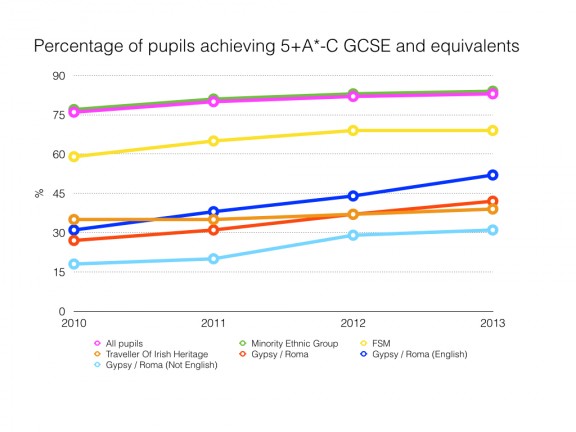Data provided by the DFE, in response to a request from ACERT, suggests that the gap between Gypsies and other pupils at GCSE is beginning to close, but that Irish Traveller achievement at 16 is flat-lining. Both these figures must also be read in the context of significant drop-out throughout the secondary phase and the substantial number of Gypsies, Roma and Travellers who change their ethnic identification.
ACERT asked for the data on the Gypsy/Roma group (red) to be split into pupils who have English as a home language (royal blue) and those who don’t (light blue). This method was used in the NFER study “Improving Outcomes for Gypsy, Roma and Traveller pupils” and broadly separates established Gypsy communities from more recently arrived Roma groups.

The data also suggests that:
- Gypsies, Roma and Travellers especially Roma start at a significant disadvantage.
- Roma are the lowest achieving group but the gap has narrowed in KS1 Average Points scores.
- Irish Travellers narrowed the gap at KS2 in Reading and Maths
- Irish Traveller Fixed Term Exclusions remain high, while Gypsy exclusions have fallen.
- Gypsies are narrowing the gap at GCSE (5+A-C E%M) but Irish Travellers are flat-lining; better picture 5+AtoG.
- Attendance for all groups has improved although Gypsy, Roma and Traveller attendance remains significantly below others
- Numbers of Roma in the school population have increased substantially but remain small as a proportion of total population
- Increasing numbers English First Language Gypsy/Roma in Primary, but not in secondary
- Dropout remains a huge problem and KS3 and 4
The full data and a presentation are available at https://acert.org.uk/education-data-2012-3/


